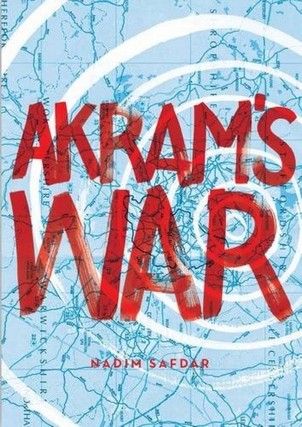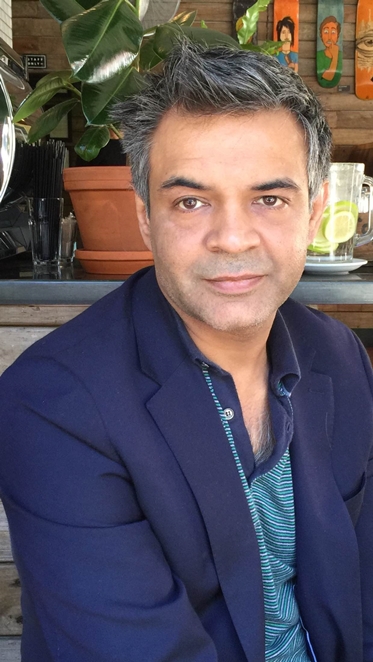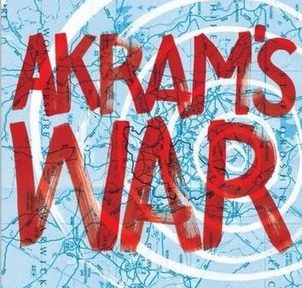This post was contributed by Valeria Melchioretto. This summer the Birkbeck Creative Writing department launched its new website The Mechanics’ Institute Review Online. This year marks a huge success for the Creative Writing MA as ten alumni have novels coming out this year.
To celebrate these achievements we are profiling a selection of the authors and extracts from their upcoming novels will appear on MIROnline. Here, Valeria speaks with alumnus Nadim Safdar, about his debut novel, Akram’s War (Atlantic, May 2016)
Read an extract of the book at MIROnline
VM: Firstly, congratulations on your debut novel Akram’s War which has just been published by Atlantic and thanks for taking part in this interview. We are keen to learn about your career so far. If you had to pick the most significant learning experience from your entire MA, what would it be?
NS: I feel fortunate that I come from a scientific background in which what we were taught was empirical and fact. It is not so different in the Creative Arts – the idea of form, structure, characterization and whether or not a situation or scene or phrase has been earned – these things I had to be taught. I listened carefully and writing the book, I built a shed in the rear of the garden and having sacrificed the day-job, I thought of little else for over four years. My day would begin around 10 at night when (my now wife) would go to bed and I’d work through.

Image credit: Sahar Afzal
Debut novels are famously thought to be, at least in parts, autobiographical. How much inspiration have you drawn from firsthand experience and how much is down to research or fiction?
It is surprising how you live within the character and indeed, how much of your character(s) live in you. There are two main characters in the book, Akram and Grace and during the four years of writing them, I often found myself (in real life) at a point of decision-making and wondered – what would Akram or Grace have done?
It won’t come as a surprise to me that readers’ might ask what I have in common with Akram (a Pakistani male). We men think we know how to fight but there are some battles we are not equipped for.
I therefore had to find the character Grace – and through her express the story of someone at the mercy of a system she is not equipped to deal with. I had to make the story of losing one’s child (or even the ever-present day-to-day threat of that loss) acceptable to the reader and for that to be believable it could only be expressed through the eyes of a woman.
We all have lived experience: have loved, fought, wounded others and scarred ourselves. You might want to but you can’t just blurt it out – writing is about finding a form in which to put it.
Your book has a strong message about the radicalisation of British Muslims. Over the last couple of years the topic has become ever more pressing, with the rise of ISIS etc. Could you see it coming?
Although no one could see it coming, I don’t think anyone could say, in retrospect, that the unfolding events weren’t inevitable.
The first Muslim has been sworn in as London’s new Mayor. Do you think he might be a role model for young British Muslims and could this event mark a turning point for radicalisation? Or what do you think it all means?
I think it means that the majority of Londoner’s are relatively poor and prefer the socialist candidate.
There is a whole genre of novels based on politically and socially urgent topics. I am sure you are familiar with the work of Lionel Shriver and so on. There is often talk about writers having an obligation to make social comments. How important is it for a writer to pick a relevant subject that features in the media or do you think that topics pick their writers and it’s about following one’s hunch whatever the subject matter?
Lionel Shriver talks about writing about people who ‘are hard to love,’ and with a protagonist who is something of a loner and an outsider there is much more to explore and say. To me, such people are far more interesting. In terms of social commentary, why would a writer like myself want to be between two intractably opposed sides murdering each other with any means at their disposal. The book is a complete work of fiction and has to exist all by itself.

Nadim Safdar (Image credit: Sahar Afzal)
How do you know when you are onto something big? Moreover, when do you know the novel you are writing is finished?
I wrote down one single phrase, printed it out large and posted it to the wall. After that, I had to invent the character and somehow, through 80,000 or so words, make him earn that phrase. It might sound arrogant but knew I had it in that first phrase.
The end point was more prosaic, the character Akram had simply run his course and had nothing more meaningful to say.
Was there much more work that needed to be done on the novel after finding an agent?
I was fortunate in finding an excellent agent and publisher who really seemed to understand what I was getting at, but also and importantly, they represented the reader. Through their direction the published book is far better than the one I originally submitted. For me, from first submission to an acceptable draft took about a year.
The opening sentence of chapter one is an absolute classic and has the sharp directness that instantly engages a reader. Given that your book has such a serious content how did you find the right form for it?
The opening phrase that I posted on my wall was set in the present. To earn it I had to take my protagonist right back to childhood and, through twenty or so years of his life, work back up to it. Although the past was told in a sort of flashback narrative, those scenes originally started as a series of short story’s linked through inter-connected characters. Once I had those, I had to find a form or framework and so I set the entire novel over one night and discovered Grace, someone my protagonist could tell his story to.
Getting a book deal is any MA student’s ultimate dream. Do you now write on a full-time basis?
You don’t get paid enough to write on a full-time basis – or at least I don’t! Indeed, writing on a full-time basis almost drove me mad. A writer needs something else, whether it’s travel or family or teaching or a part time job. You need also to be out in the world.
Rumours have it that you are already working on your next novel The Journeyman which is about a boxer. Could you tell us a bit more about it?
A journeyman is a boxer who’s prone to losing and fights weekly for a living wage. A journeyman can’t afford to getting knocked out or injured as he then has to lay off for a month or more. So a journeyman is a master in defense and evasion and if he is that good, what does it take for him to win?
Barely a quarter through the new book, I already feel like I’m sitting at the bar at the Hailstone in Rowley Regis with my characters and for that feeling, a sort of writers-magic that signals I’m on to something, I’m very grateful.
Akram’s War by Nadim Safdar (Atlantic) is available now for £ 12.99
Nadim Safdar was born to Pakistani parents and grew up in the Black Country. He is married with three young children and lives in London. His first novel, AKRAM’S WAR, was published by Atlantic in May 2016.

Valeria Melchioretto
Valeria Melchioretto is the author of Podding Peas and The End of Limbo. She received a bursary from the Arts Council. In 2012 she represented Switzerland at the Poetry Olympics at the South Bank and won the ‘New Writing Ventures’. She holds an MA in Creative Writing from Birkbeck and a MA in Fine Art.

